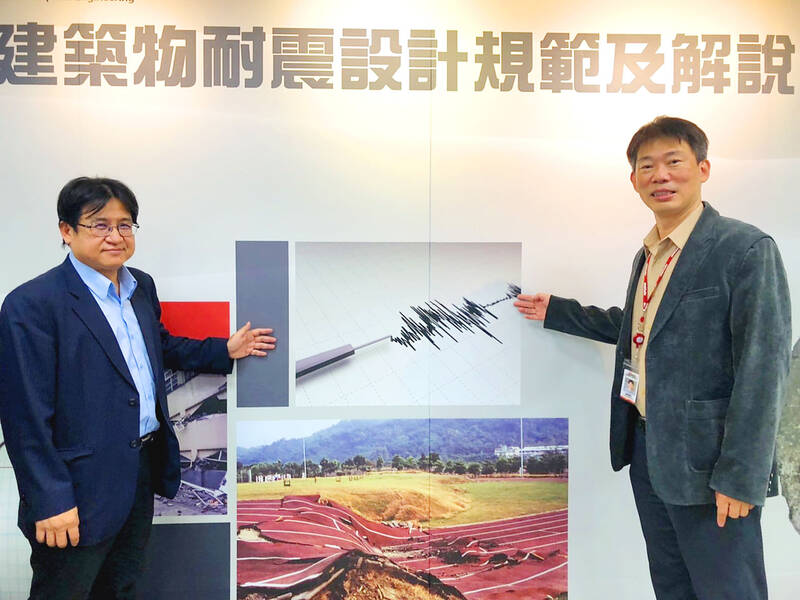The Ministry of the Interior yesterday outlined recent changes to building codes that include new mandates to reinforce structures susceptible to earthquakes.
The amendments to the Building Earthquake Resistance Design Regulations and Explanation (建築物耐震設計規範及解說) went into effect on Oct. 1.
Many tall buildings in Taiwan have been improperly modified to house street-level shop fronts, which can compromise structural integrity during a quake, National Center for Research on Earthquake Engineering Director-General Chou Chung-che (周中哲) told a news conference.

Photo: Yang Yuan-ting, Taipei Times
Illegal constructions on top of buildings are another vulnerability common in buildings throughout the nation, he said.
The new rules require susceptible buildings to install ad hoc structural reinforcements to boost safety until a long-term solution can be implemented, be it an overhaul or demolition, Chou said.
The ministry and the center have ensured that every vulnerable student dormitory up to the junior-high school level has been reinforced, he said, adding that they are now focusing on hotels, markets and other public buildings.
People who are concerned about the structural integrity of the building they live in can contact the center for help, especially for structures that have exposed pillars, he said.
The new rules revised quake resistance standards for structures near fault lines to include the ability to withstand shallow earthquakes, he added.
This means new buildings near fault lines must be 20 to 30 percent more resistant to quakes than before, which translates into an estimated 5 percent increase in construction costs, Chou said.
The center is collating information on land liquefaction cases to map risks nationwide while fine-tuning testing protocols and quality-control procedures for base isolation and quake reduction components, he said.
People are encouraged to use government subsidies to check the quake resistance of their residential buildings, Construction and Planning Agency Director-General Wu Hsin-hsiu (吳欣修) said.
“The safety of your house is far more important than its real-estate value,” he said.

Several Chinese Nationalist Party (KMT) officials including Chairman Eric Chu (朱立倫) are to be summoned for questioning and then transferred to prosecutors for holding an illegal assembly in Taipei last night, the Taipei Police said today. Chu and two others hosted an illegal assembly and are to be requested to explain their actions, the Taipei City Police Department's Zhongzheng (中正) First Precinct said, referring to a protest held after Huang Lu Chin-ju (黃呂錦茹), KMT Taipei's chapter director, and several other KMT staffers were questioned for alleged signature forgery in recall petitions against Democratic Progressive Party (DPP) legislators. Taipei prosecutors had filed

Taiwan would welcome the return of Honduras as a diplomatic ally if its next president decides to make such a move, Minister of Foreign Affairs Lin Chia-lung (林佳龍) said yesterday. “Of course, we would welcome Honduras if they want to restore diplomatic ties with Taiwan after their elections,” Lin said at a meeting of the legislature’s Foreign Affairs and National Defense Committee, when asked to comment on statements made by two of the three Honduran presidential candidates during the presidential campaign in the Central American country. Taiwan is paying close attention to the region as a whole in the wake of a

President William Lai (賴清德) has appointed former vice president Chen Chien-jen (陳建仁) to attend the late Pope Francis’ funeral at the Vatican City on Saturday on his behalf, the Ministry of Foreign Affairs said today. The Holy See announced Francis’ funeral would take place on Saturday at 10am in St Peter’s Square. The ministry expressed condolences over Francis’ passing and said that Chen would represent Taiwan at the funeral and offer condolences in person. Taiwan and the Vatican have a long-standing and close diplomatic relationship, the ministry said. Both sides agreed to have Chen represent Taiwan at the funeral, given his Catholic identity and

Lawmakers from the Democratic Progressive Party (DPP) yesterday established a friendship group with their counterparts in Ukraine to promote parliamentary exchanges between the two countries. A ceremony in Taipei for the Taiwan-Ukraine Parliamentary Friendship Association, initiated by DPP Legislator Chen Kuan-ting (陳冠廷), was attended by lawmakers and officials, including Deputy Minister of Foreign Affairs Francois Wu (吳志中) and European Economic and Trade Office in Taiwan Director Lutz Gullner. The increasingly dire situation in Ukraine is a global concern, and Taiwan cannot turn its back when the latter is in need of help, as the two countries share many common values and interests,